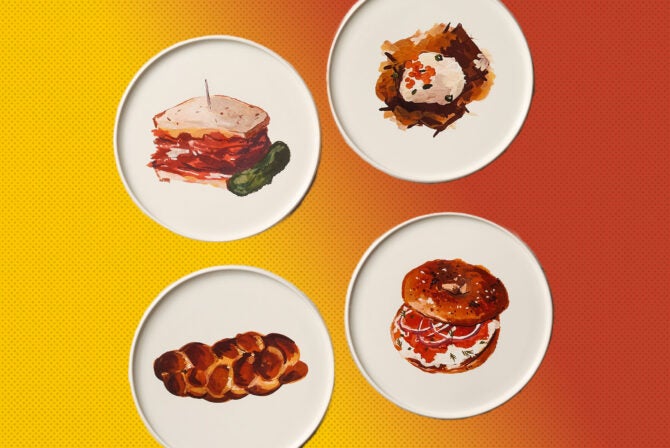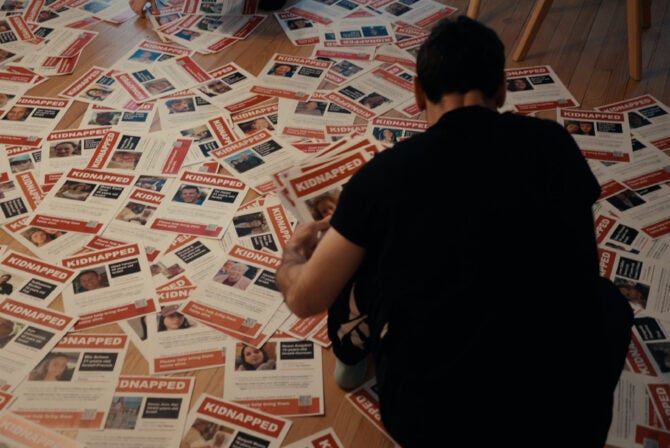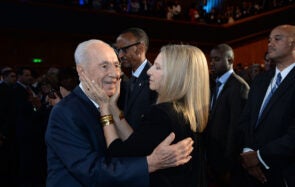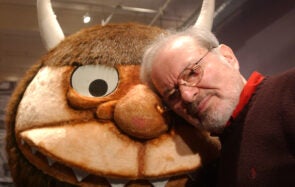Warning: spoilers for “Teenage Mutant Ninja Turtles: Mutant Mayhem” and slightly embarrassing geekiness ahead.
When I grew watching “Teenage Mutant Ninja Turtles” in Israel (imagine saying “Cowabunga” with a Hebrew accent), I never anticipated that the franchise would be the source of future parenting lessons, and yet, here we are.
I was really excited when my 5-year-old son took interested in the “TMNT” franchise earlier this year. He memorized the names of the characters, friends and villains. We read early reading books about their adventures together. We even watched some episode of the 1990s cartoon (though yes, we had to skip some that were too scary). Raising my kids with a love of Judaism is one of my biggest priorities as a parent, but raising them to share my love for the dorky franchises that buoyed me throughout my childhood also gives me much joy.
And so, last weekend, I eagerly took him and my brother, who was in town from Israel, to watch the new “Teenage Mutant Ninja Turtles: Mutant Mayhem,” directed by Jeff Rowe and produced and co-written by Evan Goldberg and Seth Rogen. Rogen even introduced the movie himself in an adorable little clip, telling viewers to enjoy the film. I relate to Rogen, who says, “For as long as I can remember, I’ve been a Teenage Mutant Ninja Turtles Fan.” I imagined my son saying that one day, too.
The movie is visually stunning. The 3D animation by French Mikros Animation studio has a lot of texture to it and feels appropriately grungy and edgy while still really beautiful. The music is absolutely infectious, with lots of ’90s hip-hop that had us shaking our legs and tapping along. And while some of the jokes feel a little belabored (there’s a milking joke I really couldn’t get into), we all laughed at multiple points in the movie. It’s genuinely a really funny, delightful watch. Or at least it was for me (more on that in a bit).
A lot of changes have been made to the story of the turtles, originally conceived as a subversive comic book in the late 1980s by Kevin Eastman and Peter Laird. This story really leans into the identities of Donatello (Donnie), Michelangelo (Mikey), Raphael (Raph) and Leonardo (Leo), which I really loved — from the choice of voice actors to making their bodies more adolescent sized. I love that April was played by Ayo Edebiri (who is in everything right now, from “The Bear” to the upcoming Emma Seligman movie “Bottoms”). Yet one the most significant updates was made to the character of Splinter, the turtles’ father figure, dubbed in the movie by the brilliant and lovable Jackie Chan. He is no longer a former Japanese ninjutsu turned humanoid rat but a former sewer rat who, like the group of turtle hatchlings, walked into a radioactive goo that turned him into a mutant.
The choice makes more sense, as even Splinter himself says in the movie, but it’s also a big part of the movie’s central narrative. As a former rat, Splinter has a natural apprehension of people, and when he steps into New York’s Times Square, he’s met with so much terror and derision that he never steps up onto the surface again.
The story of that frightening encounter becomes family lore, with Splinter warning his growing children of the human world and training them to fight and defend themselves from the vile humans.
This character of an overprotective father who wants to keep his children in an insular world is certainly universal, or at least familiar for many immigrant cultures. And a lot of stories with mutant heroes make for excellent parables about prosecuted minorities. Yet both my brother and I agreed that what he really felt like was an old Jewish dad, kvetchy and fearful, paranoid about the dangers of the outside world (we all know there is some truth to the hypochondriac Jewish dad caricature) but also overtly loving, affectionate and dedicated (and full of dad jokes).
Splinter’s redesign, which is less aging svelte athlete and more stout and grey, makes him feel almost Tevye-like, as in the protagonist of “Fiddler on the Roof” (which makes sense from Goldberg and especially Rogen, who basically played a version of Tevye in the movie “An American Pickle”). Splinter’s fear of the influence of the human world feels quite comparable to the experience of Jewish assimilation. Splinter wants to keep the turtles close, safe, with their own kind, and holds fast to the predictable rituals of training and pizza dinners. He’s all about hard-earned traditions.
But the turtles want more — they want to be part of the human world. They sneak off to movie screenings, they love anime and video games, skating and making amateur videos — and like any teenagers, they want to belong to something larger than just their nuclear family. They want to make friends! And they have to hide all of that from their father. Throughout most of the movie, the turtles try to track down and fight Flyguy — the movie’s villain, dubbed by the incredible Ice Cube — without their father’s knowledge.
When the turtles get in trouble, Splinter discovers the turtles have been sneaking behind his back, and his response is obvious disappointment. While he agrees to help them out (he is, after all, a good caring father) he vows never to let them return to the human world again after the ordeal is through.
That is, until he experiences a parenting epiphany. It’s a moment when Splinter sees his own inflexibility and harshness as a parent reflected in Flyguy and the way he treats his army of kids, or rather, mutant underlings (which include the adorable skateboarding Mondo Gecko, voiced by a darling Paul Rudd, and a singing Ray Fillet voiced by Post Malone). It’s surprisingly touching. It’s rare to see a parent get that kind of wake up call and answer it, but Splinter does just that.
He realizes that his own values, his own fear of humans, are his, and that he can and should allow his children to live the kind of life they want to — and for that, he needs to get over his paranoias. Part of being a parent, especially a parent whose seen and experienced persecution for his identity, is letting your kids be braver than you were, knowing that they’re growing up in a different world, and that they are allowed to learn their own lessons. It’s also learning to care for the things your kids care about and being their cheerleader. Splinter has a full arc in which he grows for the sake of his kids, and ultimately, that helps him find his own happiness (which involves a pretty disturbing romance with a fellow mutant, but hey, parents are allowed to be a bit kinky too).
As Jewish parents, a lot of us were raised with fears of persecution, fears of the unknown, with fear in general, and there’s something so valuable in letting that go, no matter how scary it may be. The turtles’ dreams of feeling acceptance and belonging in the outside world may seem farfetched; they are, after all, literal mutants. But in the end, by being authentic and kind, they make them happen.
The movie outing was meant to be fun, a bonding experience for my son and his uncle, and in a sense, it was. Yet, just like Splinter in the movie, the experience of watching it was also a bit of a parenting fail, and a lesson, for me.
From the moment the movie opened with an armed raid, I realized I might have made a mistake. Like many a 5-year-old, my son does not like scary movies and TV shows, and his definition of scary is a lot more broad than most, including anything remotely violent or rage-filled.
It was all fine, more or less, with a few cuddle and hand-holding sessions, and lots of popcorn noshing on his part, until we got to the movie’s biggest battle — with its biggest, most frightening monsters. He turned to me and said the words I had been dreading: “I want to go.”
“We can leave,” I told him, “but I’d like you to stay until the end, to see that there’s a happy ending.” The screening was a kid-friendly one, so talking out loud was not taboo. As we watched the dramatic final scene (which was, yeah, pretty gruesome and violent, even by regular “Teenage Mutant Ninja Turtles” standards), my brother and I both tried to explain to him what was going on — comparing it to the video game they had played the day before, telling him that here, all these people are coming together as a community to defeat the villain. We ended up leaving the theater in an OK shape, though I can’t say that my son really enjoyed the movie, and I’m still wondering if I handled it as best I could.
Perhaps, in that moment, I was so over-enthused about passing down a childhood tradition that I forgot to let my kid dictate his own rhythm. I didn’t hear his initial reluctance about watching this movie, and I didn’t realize that he was not even super into this franchise anymore (he’s all about Mario now). Perhaps I should’ve let him leave the theater when he wanted to, or not gone at all when he first waffled about heading to see the film.
All in all, I don’t think I traumatized him in any major way. But the movie was a good reminder for me, as a parent, to respect my kids — when they’re brave, of course, and want to take on the world, but also when they’re fearful.








